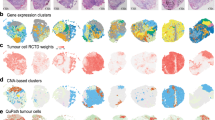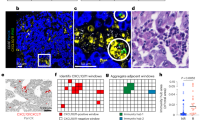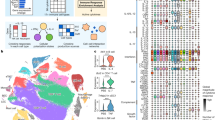Abstract
Metastatic progression depends on genetic alterations intrinsic to cancer cells as well as the inflammatory microenvironment of advanced tumours1,2. To understand how cancer cells affect the inflammatory microenvironment, we conducted a biochemical screen for macrophage-activating factors secreted by metastatic carcinomas. Here we show that, among the cell lines screened, Lewis lung carcinoma (LLC)3 were the most potent macrophage activators leading to production of interleukin-6 (IL-6) and tumour-necrosis factor-α (TNF-α) through activation of the Toll-like receptor (TLR) family members4 TLR2 and TLR6. Both TNF-α and TLR2 were found to be required for LLC metastasis. Biochemical purification of LLC-conditioned medium (LCM) led to identification of the extracellular matrix proteoglycan versican, which is upregulated in many human tumours including lung cancer5,6, as a macrophage activator that acts through TLR2 and its co-receptors TLR6 and CD14. By activating TLR2:TLR6 complexes and inducing TNF-α secretion by myeloid cells, versican strongly enhances LLC metastatic growth. These results explain how advanced cancer cells usurp components of the host innate immune system, including bone-marrow-derived myeloid progenitors7, to generate an inflammatory microenvironment hospitable for metastatic growth.
This is a preview of subscription content, access via your institution
Access options
Subscribe to this journal
Receive 51 print issues and online access
$199.00 per year
only $3.90 per issue
Buy this article
- Purchase on Springer Link
- Instant access to full article PDF
Prices may be subject to local taxes which are calculated during checkout




Similar content being viewed by others
References
Kopfstein, L. & Christofori, G. Metastasis: cell-autonomous mechanisms versus contributions by the tumor microenvironment. Cell. Mol. Life Sci. 63, 449–468 (2006)
Pollard, J. W. Tumour-educated macrophages promote tumour progression and metastasis. Nature Rev. Cancer 4, 71–78 (2004)
Weiss, L. & Ward, P. M. Lymphogenous and hematogenous metastasis of Lewis lung carcinoma in the mouse. Int. J. Cancer 40, 570–574 (1987)
Akira, S., Uematsu, S. & Takeuchi, O. Pathogen recognition and innate immunity. Cell 124, 783–801 (2006)
Isogai, Z. et al. 2B1 antigen characteristically expressed on extracellular matrices of human malignant tumors is a large chondroitin sulfate proteoglycan, PG-M/versican. Cancer Res. 56, 3902–3908 (1996)
Pirinen, R. et al. Versican in nonsmall cell lung cancer: relation to hyaluronan, clinicopathologic factors, and prognosis. Hum. Pathol. 36, 44–50 (2005)
Kaplan, R. N. et al. VEGFR1-positive haematopoietic bone marrow progenitors initiate the pre-metastatic niche. Nature 438, 820–827 (2005)
Luo, J. L. et al. Nuclear cytokine-activated IKKα controls prostate cancer metastasis by repressing Maspin. Nature 446, 690–694 (2007)
DeNardo, D. G., Johansson, M. & Coussens, L. M. Immune cells as mediators of solid tumor metastasis. Cancer Metastasis Rev. 27, 11–18 (2008)
Lin, W. W. & Karin, M. A cytokine-mediated link between innate immunity, inflammation, and cancer. J. Clin. Invest. 117, 1175–1183 (2007)
Hsu, L. C. et al. The protein kinase PKR is required for macrophage apoptosis after activation of Toll-like receptor 4. Nature 428, 341–345 (2004)
Bas, S. et al. The proinflammatory cytokine response to Chlamydia trachomatis elementary bodies in human macrophages is partly mediated by a lipoprotein, the macrophage infectivity potentiator, through TLR2/TLR1/TLR6 and CD14. J. Immunol. 180, 1158–1168 (2008)
Hiratsuka, S. et al. MMP9 induction by vascular endothelial growth factor receptor-1 is involved in lung-specific metastasis. Cancer Cell 2, 289–300 (2002)
Scaffidi, P., Misteli, T. & Bianchi, M. E. Release of chromatin protein HMGB1 by necrotic cells triggers inflammation. Nature 418, 191–195 (2002)
Nakanishi, H. et al. Structural differences between heparan sulphates of proteoglycan involved in the formation of basement membranes in vivo by Lewis-lung-carcinoma-derived cloned cells with different metastatic potentials. Biochem. J. 288, 215–224 (1992)
Fidler, I. J. The pathogenesis of cancer metastasis: the ‘seed and soil’ hypothesis revisited. Nature Rev. Cancer 3, 453–458 (2003)
Zheng, P. S. et al. Versican/PG-M G3 domain promotes tumor growth and angiogenesis. FASEB J. 18, 754–756 (2004)
Wight, T. N. Versican: a versatile extracellular matrix proteoglycan in cell biology. Curr. Opin. Cell Biol. 14, 617–623 (2002)
Schaefer, L. et al. The matrix component biglycan is proinflammatory and signals through Toll-like receptors 4 and 2 in macrophages. J. Clin. Invest. 115, 2223–2233 (2005)
Buwitt-Beckmann, U. et al. Toll-like receptor 6-independent signaling by diacylated lipopeptides. Eur. J. Immunol. 35, 282–289 (2005)
Scheibner, K. A. et al. Hyaluronan fragments act as an endogenous danger signal by engaging TLR2. J. Immunol. 177, 1272–1281 (2006)
Lokeshwar, V. B., Cerwinka, W. H., Isoyama, T. & Lokeshwar, B. L. HYAL1 hyaluronidase in prostate cancer: a tumor promoter and suppressor. Cancer Res. 65, 7782–7789 (2005)
Luo, J. L., Maeda, S., Hsu, L. C., Yagita, H. & Karin, M. Inhibition of NF-kappaB in cancer cells converts inflammation- induced tumor growth mediated by TNFα to TRAIL-mediated tumor regression. Cancer Cell 6, 297–305 (2004)
Tracey, K. J. et al. Shock and tissue injury induced by recombinant human cachectin. Science 234, 470–474 (1986)
O’Reilly, M. S. et al. Angiostatin: a novel angiogenesis inhibitor that mediates the suppression of metastases by a Lewis lung carcinoma. Cell 79, 315–328 (1994)
Urosevic, M., Kamarashev, J., Burg, G. & Dummer, R. Primary cutaneous CD8+ and CD56+ T-cell lymphomas express HLA-G and killer-cell inhibitory ligand, ILT2. Blood 103, 1796–1798 (2004)
Eckmann, L., Fierer, J. & Kagnoff, M. F. Genetically resistant (Ityr) and susceptible (Itys) congenic mouse strains show similar cytokine responses following infection with Salmonella dublin . J. Immunol. 156, 2894–2900 (1996)
Acknowledgements
S.K. was supported by the International Human Frontier Science Program Organization (IHFSPO), the National Cancer Institute-sponsored Cancer Therapeutic Training Program and a Ruth L. Kirschstein National Research Service Award. Y.K., H.T., J.-L.L., P.D. and S.G. were supported by the California Institute of Regenerative Medicine, the Japanese Respiratory Society, the Life Science Research Foundation, IHFSPO and the Crohn’s and Colitis Foundation of America, respectively. Work in the M.K. laboratory was supported by grants from the National Institutes of Health and a Littlefield-AACR grant in Metastatic Colon Cancer Research. M.K. is an American Cancer Society Research Professor. We thank S. Akira and B. Beutler for TLR and adaptor protein deficient mice, D. Zimmermann for human versican construct, R. Hoffman for DsRed-LLC cells and K. Takenaga for LLC-P29 cells. We also thank R. Gallo and K. Yamasaki for the hyaluronan-inhibiting peptides and advice, J. Varner for analysing cell migration and Santa Cruz Biotechnology for gifts of antibodies.
Author Contributions S.K., H.T., W.-W.L. and M.K. conceived the project and planned experiments and analyses, which were performed by S.K., H.T. and W.-W.L. Y.K. and J.-L.L. helped with protein purification and tail-vein injection of cancer cells and tumour analysis, respectively. P.D. and S.G. analysed M2 macrophages and tissue versican content, and effect of TNF-α neutralization on lung metastasis. M.K. oversaw the entire project and wrote the manuscript with S.K.
Author information
Authors and Affiliations
Corresponding author
Supplementary information
Supplementary Figures
This file contains Supplementary Figures 1-9 with Legends (PDF 6002 kb)
Rights and permissions
About this article
Cite this article
Kim, S., Takahashi, H., Lin, WW. et al. Carcinoma-produced factors activate myeloid cells through TLR2 to stimulate metastasis. Nature 457, 102–106 (2009). https://doi.org/10.1038/nature07623
Received:
Accepted:
Issue Date:
DOI: https://doi.org/10.1038/nature07623
This article is cited by
-
Effects of IFN-γ on the immunological microenvironment and TAM polarity in stage IA non-small cell lung cancer and its mechanisms
BMC Pulmonary Medicine (2024)
-
Pathological mechanisms of cold and mechanical stress in modulating cancer progression
Human Cell (2024)
-
Endosome associated trafficking regulator 1 promotes tumor growth and invasion of glioblastoma multiforme via inhibiting TNF signaling pathway
Journal of Neuro-Oncology (2024)
-
The Streptococcus virulence protein PepO triggers anti-tumor immune responses by reprograming tumor-associated macrophages in a mouse triple negative breast cancer model
Cell & Bioscience (2023)
-
Plasma versican and plasma exosomal versican as potential diagnostic markers for non-small cell lung cancer
Respiratory Research (2023)
Comments
By submitting a comment you agree to abide by our Terms and Community Guidelines. If you find something abusive or that does not comply with our terms or guidelines please flag it as inappropriate.



